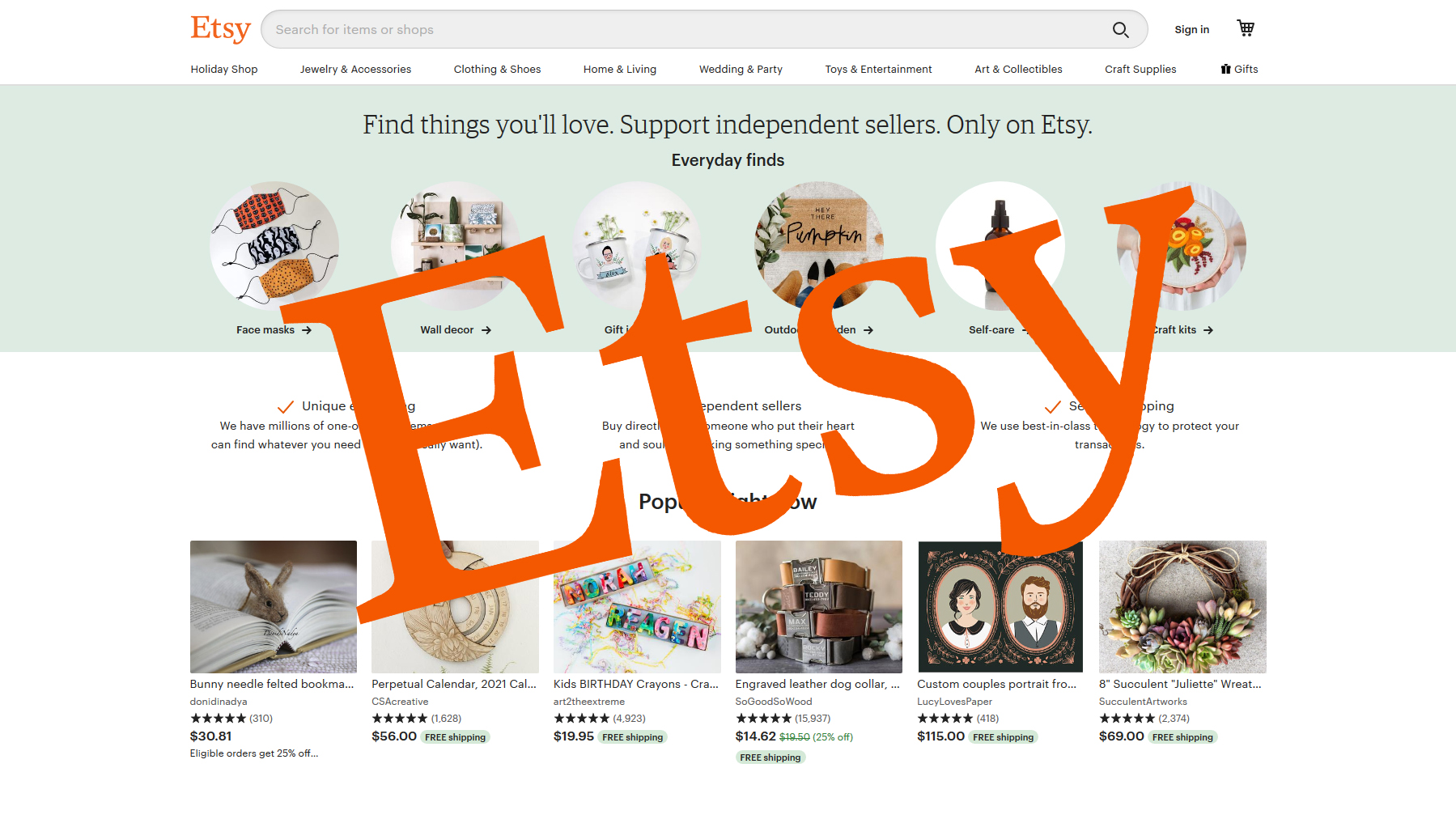Etsy Shop Success - Insights And Practical Advice
Opening a new online shop can feel like a big step, full of promise and excitement, you know? There's a real buzz about putting your creative work out there for people to discover. For many, a place like Etsy seems like the natural spot to begin that kind of adventure, offering a ready audience for unique, handcrafted items or vintage finds. It's almost like stepping into a busy marketplace, but from the comfort of your own home, which is pretty cool.
But what happens after the initial excitement of getting your shop set up, when the first few messages start coming in? Sometimes, the reality of running a shop, especially a brand new one, can be a little different from what you might expect. You might find yourself dealing with unexpected situations, like messages that just don't feel right, or questions about things that seem a bit off.
This article is here to share some real-world experiences from people who have been there, selling their creations and products. We'll look at some common issues and talk about how people handle them, offering some ideas and helpful thoughts for anyone looking to make their time on the platform a good one. We're going to talk about a few things that come up for sellers, from dealing with odd messages to getting products listed correctly, and even what happens when a shop closes its virtual doors.
Table of Contents
- Dealing with Unusual Messages in Your Etsy Shop
- Finding Community Support for Your Etsy Shop
- Print-on-Demand Challenges for Your Etsy Shop
- What Are Realistic Earnings from an Etsy Shop?
- Managing Many Listings in Your Etsy Shop
- Why Are Shop Policies Important for Your Etsy Shop?
- What Happens When an Etsy Shop Closes?
- Getting Help with Your Etsy Shop
Dealing with Unusual Messages in Your Etsy Shop
Imagine this: you just opened your shop, and in a very short time, like less than three days, you start getting messages that feel a little off. For some, these messages often ask for an email address to finish a purchase. This kind of request can be a red flag, to be honest. It's a common trick used by people who aren't really looking to buy anything, but rather to get your personal information. You know, they want to take the conversation outside of the platform, which is generally not a good sign.
When you get messages like these, it's pretty much a good idea to be careful. The platform has its own messaging system for a reason, and that reason is to keep everything secure and recorded. If someone wants to move the conversation to email right away, it could mean they're trying to get around the platform's safety measures. So, what do you do? Many sellers find it best to just mark these messages as spam. This helps keep your inbox clear and also tells the system that these kinds of messages are not wanted. It's almost like setting up a filter to protect your space. Keeping all communication on the platform helps protect both you and the person buying from you, as it creates a record of everything that's been said and agreed upon.
It's important to remember that legitimate buyers usually don't need your email to complete a purchase. The platform handles all the payment details and order information directly. So, if you get a message that seems suspicious, trust your gut feeling, you know? It's better to be safe than sorry, especially when you're just starting out and getting used to how things work. There are plenty of resources out there to help you spot these kinds of unusual requests, and staying informed is a big part of keeping your shop safe and sound.
Finding Community Support for Your Etsy Shop
Starting and running an online shop can sometimes feel like a solo activity, but it doesn't have to be. There are actually many places where people who sell on platforms like Etsy come together to share what they've learned, talk about difficulties, and celebrate successes. One such place is on Reddit, where there are specific groups just for sellers and people who buy things. These groups are like big online meeting spots where you can ask questions and get answers from others who understand what you're going through.
These online communities are really useful for sharing different selling techniques and talking about how to build up your shop. For example, if you're trying to figure out how to make your listings stand out, or if you're having trouble with a certain part of the selling process, someone in the community has probably faced something similar. They can offer advice based on their own experiences, which is incredibly helpful. It's a way to get real-world tips from people who are actively doing what you're doing, so you get practical advice. You might find discussions about how to handle customer service, or how to take better photos of your items, or even just general encouragement when things feel a bit tough.
Being part of a community like this means you're not just guessing about things. You can learn from the collective wisdom of many sellers. It's also a place to feel less alone when you hit a snag. Whether it's a small problem or a bigger one, knowing there's a group of people ready to offer their thoughts and support can make a big difference. So, if you're looking for a place to connect and grow your knowledge about running your shop, checking out these dedicated online spaces is definitely something to consider. They're basically a goldmine of shared experiences and useful information, and you'll probably find a lot of people who are happy to help you out, which is pretty cool.
Print-on-Demand Challenges for Your Etsy Shop
For someone who has spent over two decades selling on platforms like eBay, getting into print-on-demand (POD) can feel like a whole new ball game. You might have set up an account with a service like Printify, expecting everything to just click into place. But then, you might notice that products from Printify show up on your shop page, yet they are marked as 'unavailable.' This can be really confusing, especially when you're used to a different way of doing things, you know?
This 'unavailable' status often points to a connection issue or a setting that isn't quite right between the POD service and your shop. It's not uncommon for new sellers to POD to run into these kinds of snags. The process involves a few more steps than just listing an item you already have in stock. You're connecting two different systems, and sometimes, a small detail can cause a big hiccup. It could be something with how the product variants are set up, or perhaps a shipping profile isn't quite aligned, or maybe even a stock setting needs a little tweak. It's almost like learning a new language for your inventory.
Getting these things sorted out usually involves going through the setup guides for both the POD service and your shop, step by step. Sometimes, it's a matter of double-checking that all the product details, like sizes, colors, and prices, are correctly transferred and matched. If you're coming from a background of direct sales, where you handle the item yourself, the idea of a third party creating and sending your products is a different way of working. So, when you see something marked as 'unavailable,' it's usually a technical thing that can be fixed with a bit of patience and checking the settings. It’s pretty much a common first hurdle for many who are new to this particular selling method, and it’s definitely something that can be worked through with a bit of effort.
What Are Realistic Earnings from an Etsy Shop?
When people think about opening an online shop, there's often a hope of making a lot of money, and quickly. However, it's important to have a clear picture of what's typical. The truth is, the vast majority of shops do not make a huge amount of money. That doesn't mean it's impossible to do well, but it's not the usual experience for most. Many shops might just cover their costs, or make a little extra spending money. This is a pretty common reality for many small businesses, actually, both online and off.
On the other hand, there's a small group of shops that do extremely well, making a good amount, or even a very large amount, of money. These are the shops that often get talked about, and they can sometimes give a skewed idea of what everyone else is earning. What sets these shops apart? It could be a combination of things: unique products, great marketing, a strong understanding of their audience, consistent effort, and sometimes, just being in the right place at the right time. It's not usually an overnight success, but rather a result of steady work and smart choices, you know?
So, if you're thinking about selling, it's good to go in with realistic expectations. While it's absolutely possible to build a profitable business, it often takes time, dedication, and a willingness to learn and adapt. Don't compare your beginnings to someone else's middle or end. Focus on what you can control: the quality of your products, how you present them, and how you connect with people who might want to buy from you. Success, in this context, looks different for everyone, and it's not always about making a huge profit. Sometimes, it's about the joy of creating, or connecting with customers who appreciate your work, which is pretty valuable in its own way.
Managing Many Listings in Your Etsy Shop
Having a shop with many items, let's say around a hundred listings, can be a bit of a balancing act. It's great to have a wide selection for people to look at, but it can also become a bit tiring when you need to make changes to a lot of items at once. This is especially true if you use variations a lot, like different sizes, colors, or materials for the same product. Making updates one by one can take a very long time, and honestly, it can feel like a never-ending task.
There are tools available, like the batch editor, that can help with some of these tasks. For example, it's often useful for changing things like titles across many listings all at once. This can save you a good bit of time. However, these tools sometimes have their limits. They might not be able to handle every type of update you want to make, especially when it comes to those product variations. So, while you can quickly adjust titles, you might still find yourself manually adjusting each size or color option for every item, which is pretty tedious, actually.
Because of these limitations, many sellers look for ways to streamline their work. This might involve planning out updates in groups, or even using spreadsheets to keep track of product details outside of the platform, then updating things in batches when possible. It's about finding a system that works for you to keep your shop current without spending all your time on administrative tasks. It's kind of like organizing a big closet; you need a system to find things easily and put them away quickly, otherwise, it just becomes a mess, you know? And that can definitely take away from the fun of creating new things.
Why Are Shop Policies Important for Your Etsy Shop?
Think of shop policies as the rulebook for your business. They cover things like how you handle returns, how long shipping takes, and other important details about buying from your shop. Having these policies completely filled out is a really good idea, and it's actually something that helps both you and the people who buy from you. When someone places an order, they should be able to easily find and understand what to expect. This helps avoid misunderstandings down the line, which is pretty much what every seller wants.
These policies create a sense of trust. When a buyer sees clear, well-written policies, they feel more confident about making a purchase. They know what to do if an item isn't quite right, or if they have questions about delivery. It shows that you're a serious seller who has thought about the different situations that might come up. It's essentially your way of communicating how you do business, in a very clear and open way. This transparency can make a big difference in how people view your shop and whether they decide to buy from you.
Moreover, shop policies also offer you, the seller, a layer of protection. If there's ever a disagreement about an order, you can refer back to your stated policies. This can be very helpful in resolving issues fairly and quickly. So, while it might seem like a bit of paperwork to fill out, taking the time to make sure your shop policies are thorough and easy to understand is a really important step. It's basically setting up clear boundaries and expectations for everyone involved, which makes for a smoother experience all around, you know?
What Happens When an Etsy Shop Closes?
It's important to know that shops sometimes close down. This can happen for a couple of reasons. Sometimes, a shop might be suspended by the platform because it didn't follow certain rules or policies. Other times, the person running the shop might decide to close it themselves and move on. In either case, if you've placed an order with a shop that has closed its virtual doors, you are entitled to certain things. This is a pretty common question that comes up, and it's good to be aware of your rights as a buyer.
When a shop is suspended, it usually means there was a serious issue with how it was operating, or perhaps a policy was broken. If a seller closes their shop voluntarily, it's often because they've decided to stop selling, or they're taking a break, or moving to a different platform. Regardless of the reason, the platform usually has systems in place to make sure that people who have made purchases are still taken care of. This might involve getting a refund if an item wasn't sent, or if there was a problem with the order that couldn't be fixed. So, if you find yourself in this situation, don't worry too much, as there are steps you can take.
The key thing to remember is that even if a shop is no longer active, your rights as a buyer are usually protected. You can often contact the platform's customer support to get help with an order from a closed shop. They can look into the situation and help you figure out what your options are, whether it's getting your money back or something else. It's essentially a safety net to ensure that people aren't left without recourse if a shop suddenly disappears. So, if you've made a purchase and the shop closes, it's not the end of the story; you still have ways to get assistance, which is pretty reassuring, I think.
Getting Help with Your Etsy Shop
Sometimes, running your shop means you'll need a little help, and knowing where to get it is pretty important. We've talked about things like odd messages, setting up print-on-demand products, dealing with many listings, and understanding what happens if a shop closes. For all these situations, and many others, there are resources available to support you. It's almost like having a guide for when things get a bit tricky, you know?
One of the first places to look for help is often the platform's own support sections. They usually have articles and guides that cover common questions and problems. These can be really useful for figuring out technical issues, like why a print-on-demand item might be showing as 'unavailable,' or how to best fill out your shop policies. For more specific issues, like when you're dealing with a scam message, the platform also has ways to report these things, which helps keep the whole community safer. So, it's definitely worth exploring what's already there.
Beyond the official support, remember those community groups we talked about? They are also a great place to get practical advice from other sellers. Sometimes, hearing how someone else solved a similar problem can be the most helpful thing. Whether it's about making bulk updates to your listings, or understanding what realistic earnings look like, these groups offer real-world experiences. So, whether you're just starting out or have been selling for a while, there's always a way to get the support you need to keep your shop running smoothly and successfully, which is pretty much what everyone wants.
This article has shared some real-world experiences from people who sell on Etsy, covering topics from handling suspicious messages and understanding print-on-demand challenges to managing many listings and the importance of shop policies. We also looked at realistic earnings and what happens when a shop closes. The piece highlighted the value of community support for sellers.

Etsy Logo Template

Etsy Logo, Etsy Digital File, Etsy, Svg, Png, Pdf, Jpeg, Jpg, Sticker

For Beginners: Your Own Etsy Store Makes Online Selling Easy - Artists